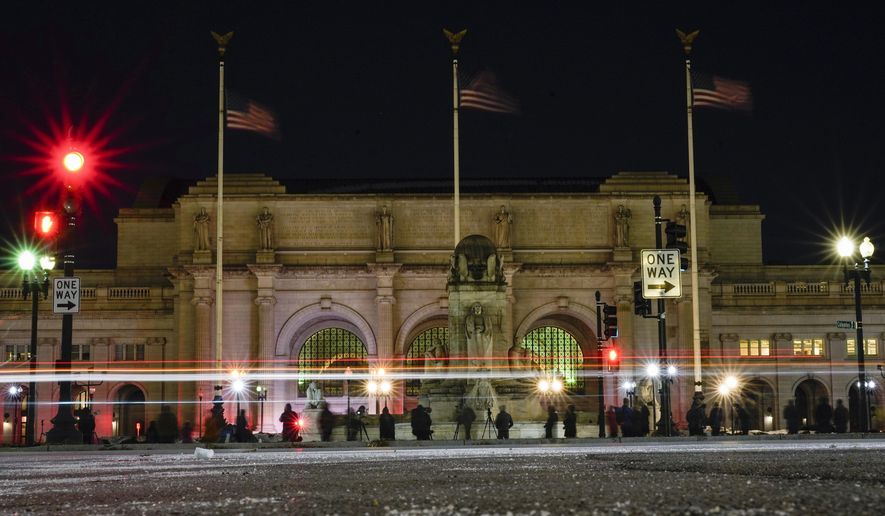Commuters in the nation’s capital found a nasty surprise waiting for them at Union Station on the morning after Holocaust Remembrance Day: more than 50 hand-drawn swastikas on the stone pillars in front of the main entrance.
Vandals drew the Nazi image overnight, leaving commuters to find it on Friday morning on the building, which is owned by the federal government and was added to the National Register of Historic Places in 1969.
A spokesperson said the Metropolitan Police Department is assisting Amtrak Police to investigate the incident as a possible hate crime.
Federal hate crime legislation punishes bias-motivated violence with 10 years to life in prison and more serious bias-motivated crimes by the death penalty.
If the investigation does not determine the vandalism to be a hate crime, D.C. police said it will be treated as a misdemeanor offense.
Gil Preuss, CEO of the Jewish Federation of Greater Washington, said in a statement Friday afternoon that D.C. police and security guards informed him that an unnamed homeless person was their prime suspect in the vandalism.
“Through them, we have learned that the person involved is homeless and a mental wellness services consumer, and we are relieved to know that the antisemitic graffiti will be removed as soon as possible,” Mr. Preuss said. “Our Jewish community will continue to stand strong and resilient in the face of hatred and antisemitism, and in encouraging mental health services for all who need them.”
The statement added that the graffiti comes amid a “recent surge in antisemitism over the past year, including the hostage crisis at Congregation Beth Israel in Texas two weeks ago and the antisemitic fliers that have been disseminated in DC, Miami, Denver and San Francisco over the last few weeks.”
Amtrak Police would not immediately confirm whether security cameras captured the incident or explain what security officers were doing inside while the vandals covered the exterior of the building.
But Amtrak spokesperson Kimberly Woods appeared to rule out ordinary vandalism in a statement emailed to The Washington Times.
“Amtrak strongly condemns this act of hatred and will work with our landlord, USRC and their lessor to remove these symbols as quickly as possible,” Ms. Woods said.
Union Station, a landmark in the city located just blocks from the U.S. Capitol, was designed by the renowned architect Daniel Burnham. The station opened in October 1907 and was completed in April 1908.
Facilities crews spent the morning taping paper and plastic signs over the graffiti, which also included profane phrases directed at former President Barack Obama, to cover it up until they erase it.
Images of the swastika-bedecked pillars spread quickly on Twitter before grounds crews could hide them, sparking outrage.
“This is not okay,” Sheila Katz, CEO of the National Council of Jewish Women, wrote on Twitter. “Your Jewish friends are exhausted and need you as partners in calling out antisemitism.”
Sen. Bob Menendez, New Jersey Democrat, posted a video of the images from his staff and called them “sickening.”
“Anti-Semitism is real and we cannot tolerate it,” Mr. Menendez wrote. “I am contacting the local authorities.”
Michal Cohen, chief marketing officer for the nonprofit Jewish on Campus, also posted a photograph of the graffiti.
“It’s been [one] day since Holocaust Remembrance Day and there are swastikas all over Union Station in Washington, D.C.,” she wrote. “This is my home.”
The United Nations designated International Holocaust Remembrance Day to mark the anniversary of the Allied liberation of the Nazi death camp at Auschwitz-Birkenau in Poland on Jan. 27, 1945.
Social influencer Liora Rez, executive director of the watchdog group StopAntisemitism, told The Washington Times that such incidents close to the annual memorial are not uncommon.
“We are sickened to our stomachs seeing swastika graffiti the day following Holocaust Remembrance Day in our nation’s capital,” Ms. Rez said. “Antisemitism is ablaze and we demand our judicial figures start prosecuting and punishing these acts to the fullest extent of the law.”
• Sean Salai can be reached at ssalai@washingtontimes.com.




Please read our comment policy before commenting.